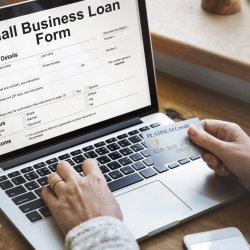Working from Home: Your complete guide to expenses, claims and accountancy

According to figures from the Trades Union Congress (TUC), the number of people working from home on a regular basis now exceeds 1.7 million, with millions more embracing this arrangement due to the coronavirus pandemic. During the strictest Covid-19 lockdown, all non-essential workers were instructed to work from home where reasonably possible to help reduce transmission rates. Homeworking offers flexibility, a better work-life balance and safety in light of Covid-19, but with that comes the responsibility to ensure certain legislative requirements are met.
Whether you work from home as an employed person, or self-employed, HMRC will expect clear and accurate accounting records to be submitted, backed up by documentary evidence in some instances.
Here we look at the expenses you can claim as a home worker, your accounting obligations, and the penalties imposed for non-compliance.
Are you employed or self-employed?
Broadly speaking, home workers can be divided into two groups, the employed and self-employed. So what types of expense can you claim?
Self-employed (apart from limited companies)
You can claim a proportion of your household running costs if you use your home for work. These might include:
- Heat and light
- Telephone
- Internet
- Council Tax
- Mortgage interest
- Rent
- Home insurance if you don’t have a separate policy for business
- General repairs to your home
- General maintenance
- Cleaning
It is vital to retain all your bills when making a claim, so calculations can be supported if HMRC question any of your figures.
Employed
If you work from home on an employed basis, you’re only able to claim expenses that are solely related to work. These potentially include:
- Heat and light for the room you work in
- Use of the phone for business
You can currently claim a flat rate of up to £6 per week for expenses from 6 April 2020 (£4 per week for previous tax years), without the need to provide supporting evidence, which may be a better and easier method in some instances.
As a result of the coronavirus pandemic, all non-essential workers were ordered to work from home following the first lockdown announcement on 23 March 2020. If you worked from home since this date or at some point during 2020/2021 due to Covid-19, you should be able to claim tax relief.
If your employer hasn’t contributed to a work from home allowance or reimbursed your work from home expenses, you should be eligible to claim tax relief. As businesses across the country invest in IT infrastructures and adjust client services to cater to the change in working style, this normalises work from home, making way for a surge in people working from home, post-Covid-19.
Self-employed and running a business from home
There are two ways of calculating how much to claim for business use of the home:
- You take into account whether your home office is solely used for business purposes, and if not, calculate the proportion of your bills that relate to the business.
- Use HMRC’s ‘simplified expenses’ system - to be eligible your turnover must be below the VAT threshold (£85,000 for 2020/2021 tax year), and you must be a sole trader or in a partnership (but not with limited liability).
Calculating home working expenses
If you don’t use the simplified expenses method, you need to find a way to calculate the cost of using your home as a business that is ‘reasonable.’ It’s a good idea to seek professional help from an accountant, as HMRC will carefully scrutinise any expense claims.
A common method is to consider the total number of rooms in your home, and the proportion they are used for business purposes. Taking the cost of heat and light as an example, if your home has 10 rooms and you work on your business in one room for three days per week, you would:
- Divide your annual energy bill by 10 and the resulting figure by three, to arrive at your allowable expense
This calculation can be applied to other claimable expenses such as cleaning, but some costs (such as telephone and broadband) may be better apportioned according to actual usage.
Simplified expenses
HMRC introduced the simplified expenses scheme to make accounting easier for small businesses, and negate the need for calculation of individual costs. If you’re eligible, it allows you to use a flat rate for some business expenses, including home working.
This method is based on the number of hours worked at home each month, as follows:
- 25 – 50 hours: claim a flat rate of £10 per month
- 51 – 100 hours: £18 per month
- More than 100 hours: £26 per month
This system makes calculations quick and easy when compared with working out actual usage, but again a qualified accountant should assess whether it’s the best way for your particular business.
Working from home as an employee: how does this differ?
Unlike the self-employed, employed people for whom working from home is mandatory, can’t claim any expense that isn’t wholly business-related, such as mortgage interest or broadband.
Any claims in excess of £6 per week will need to be backed-up by evidence, and it’s worth noting that if you work voluntarily from home you won’t be able to claim any related expenses.
Accounting obligations when you work from home
You must keep proper accounting records, and be able to provide the necessary supporting documents if requested by HMRC. Should your expense claims be high when compared with similar types of business, or HMRC are suspicious in any way, they may contact you for more information or an explanation.
So what exactly do they mean by ‘proper’ records? All business income and expenditure needs to be recorded within a reliable system such as an accounting software package. For small businesses with fewer transactions, an Excel spreadsheet or paper-based system may be sufficient.
You must record:
- Sales and other income
- Business expenses
- PAYE records if you’re an employer
- VAT records if you’ve past the threshold
- Information about your personal income
Supporting documents including bank statements, receipts, and invoices may also be needed at some point, and must be retained for six years either in their physical form or digitally.
What are the penalties for non-compliance?
HMRC make record-keeping checks on small businesses, where officers phone or visit to establish how the business is run and that the correct records are kept. They will contact you by phone initially, but may also visit your office.
If you don’t comply with their accounting requirements after you’ve had a chance to improve your record-keeping, you could face a financial penalty. This is usually £500 for the initial failure, reduced to £250 for new businesses in their first year.
The penalty for deliberately destroying your records can be as much as £1,500-£3,000, so it pays to make sure you’re following the rules.
Dealing with HMRC can be very stressful, and most small business owners welcome help and guidance from qualified professionals. Handpicked Accountants have long-established working relationships with accountants throughout the UK, and can recommend a professional in your area.


